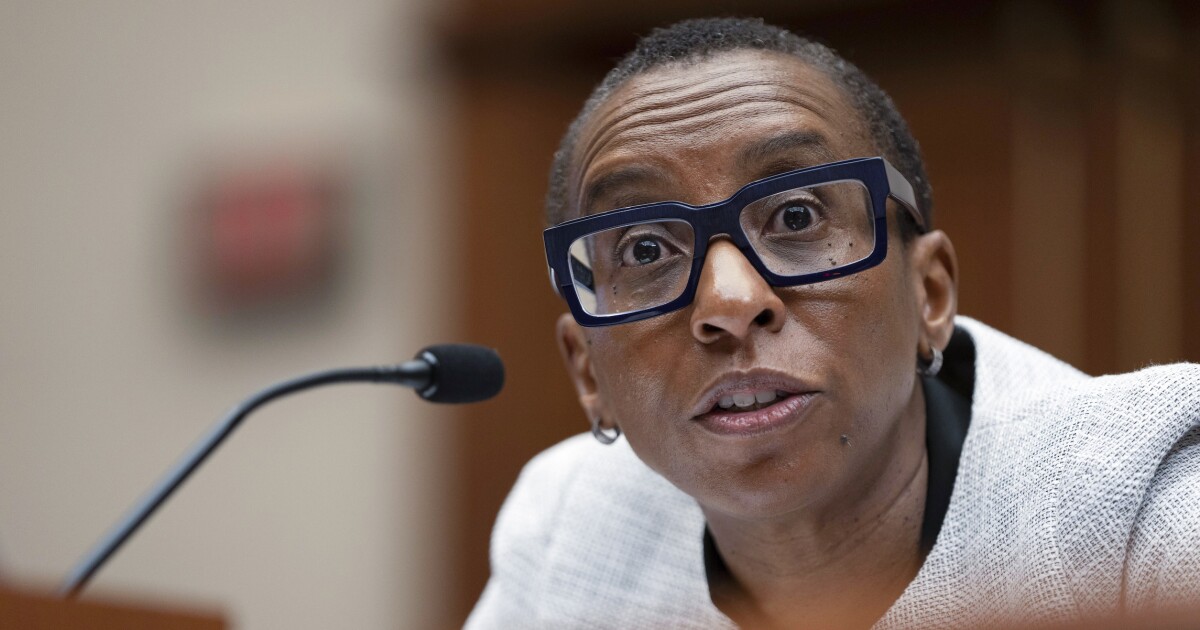

Claudine Gay’s short tenure as the president of Harvard University has been marked by controversy over her response to antisemitism on campus, but her academic and professional record is drawing new scrutiny, including allegations of plagiarism.
Gay, who took over as Harvard president in July, has been under fire since last Tuesday, when she testified before the House Education and the Workforce Committee during a hearing focused on rising antisemitism on college campuses. During that hearing, Gay, under questioning from Rep. Elise Stefanik (R-NY), refused to say if calling for the genocide of Jews is a violation of the university’s harassment policy.
BIDEN LOSING YOUNG VOTERS TO TRUMP AS HE FALLS BEHIND IN TWO SWING STATES
The hearing came two months after the Oct. 7 Hamas terrorist attacks in Israel that claimed the lives of more than 1,200 people. In the days after the attack, several Harvard student groups released a statement that said Israel was to blame for the violence.
Facing growing calls for her resignation, Gay’s record as a Harvard administrator, faculty dean, and academic is drawing new scrutiny, with activists focusing on her history of pushing for the expansion of diversity, equity, and inclusion at the university.
Conservative activist and Manhattan Institute senior fellow Chris Rufo published a review of Gay’s academic work that alleges the Harvard president may have plagiarized portions of her 1997 doctoral thesis.
Rufo’s questions about Gay’s thesis were followed by a Washington Free Beacon report exploring additional alleged instances of plagiarism from Gay’s published academic works spanning more than two decades.
In a statement to the Boston Globe, Gay said she stood “by the integrity of my scholarship.”
“Throughout my career, I have worked to ensure my scholarship adheres to the highest academic standards,” Gay said.
In a letter to the Harvard Faculty of Arts and Sciences dated August 2020, Gay, who was the dean of arts and sciences at the time, said the response to the protests that arose after the death of George Floyd in May of that year provided “a profound opportunity for institutional change that should not and cannot be squandered.” She went on to outline plans to expand faculty hires in “ethnicity, indigeneity, and migration,” as well as plans to appoint a dean of “Diversity, Inclusion, and Belonging” and to enact programs designed to hire more staff from minority backgrounds.
“As we begin this historic year, I offer you my personal commitment to be a partner and ally in the work for equity and justice,” she wrote at the time. “And I urge you all to lean into the profound optimism that animates our mission and join your colleagues in building what will ultimately be a proud chapter in the long story of Harvard.”
In an interview with the Washington Examiner, Jay Greene, a senior research fellow in education policy at the conservative Heritage Foundation, said DEI played a significant role in Gay’s rise to the top at Harvard.
“DEI is something that Harvard has institutionally committed to, and that’s part of why she was selected as its president,” Greene said. “It is because of both her commitment to that project and also her personal representation of the values of that project.”
But, Greene said, Harvard’s and Gay’s commitments to DEI do not tell the whole story.
“Claudine Gay personally has used DEI as a tool for eliminating potential critics and clearing the path for her rise to the top,” he said. “So DEI is not just an ideological worldview — it is also a tool, a club that is used to defeat one’s enemies.”
Greene explained that during Gay’s tenure as dean of the Harvard Faculty of Arts and Sciences, the now-president of Harvard had orchestrated the cancellation of two black professors, Roland Fryer and Ronald Sullivan, who he said “would have been in a position to call her out as a mediocrity.”
Fryer, a professor who had published research that said black people were not more likely than white people to be shot by police, faced allegations of maintaining a hostile work environment that led to a two-year suspension. Sullivan, a law professor, lost his position as a faculty dean after similar allegations in 2019 that came after outcry over his decision to join the legal team of disgraced Hollywood mogul Harvey Weinstein in his high-profile rape trial.
CLICK HERE TO READ MORE FROM THE WASHINGTON EXAMINER
Greene said Gay’s commitment to DEI “is a personal power” and not ideological. If the board chooses to remove her, he said, it won’t “undo all of the other institutional commitments, but it will set an example that this is not the way to thrive at Harvard.”
“Just as she set examples that move the institution in one direction, her removal could set an example that moves the institution in the other direction,” he said.





